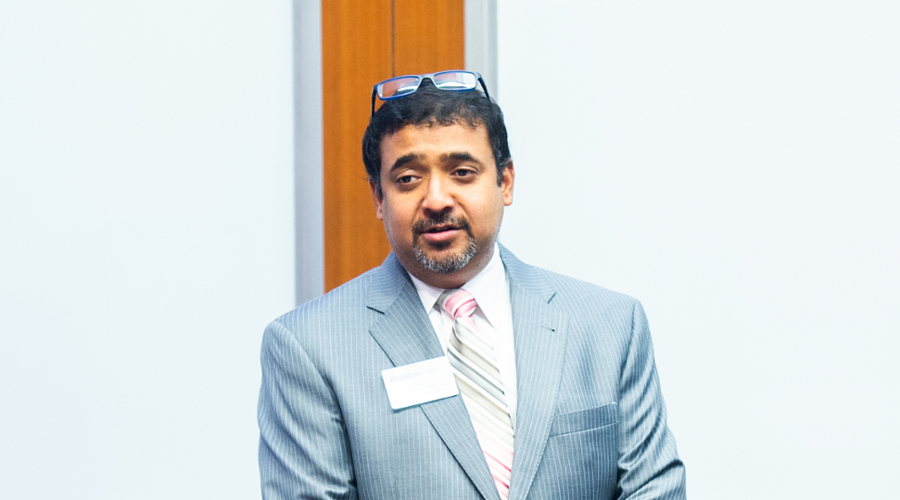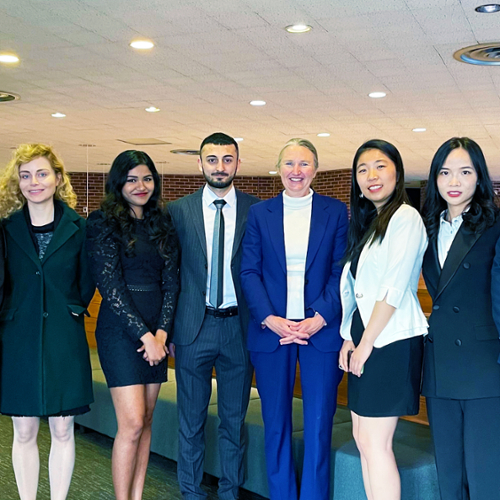
Prof. Debarshi Nandy led Brandeis University's involvement in developing Mass Fintech Hub.
Brandeis University is contributing to a public-private coalition in Massachusetts that believes financial technology is the Bay State’s next big thing.
Brandeis is among the partners behind Mass Fintech Hub, an initiative launched earlier this month in an effort to boost the state’s growing FinTech sector.
“Massachusetts startups are known to solve hard, deep-tech problems,” said Prof. Debarshi Nandy, the Barbara and Richard M. Rosenberg Professor of Global Finance at Brandeis International Business School. “That’s why I think Massachusetts will ultimately lead in FinTech. The state’s academic strength in cutting-edge research, combined with its deep regulatory and policy experience and historical strength in money management, provide Massachusetts with a strong comparative advantage.”
The International Business School is a recognized leader in FinTech education.
After developing the FinTech concentration in the school’s Master of Science in Finance (MSF) program, Nandy led Brandeis’ involvement with Mass Fintech Hub.
Nandy shared his thoughts on the new effort, which includes partners spanning the finance industry, state government, nonprofits and academia.
The goal of Mass Fintech Hub is to make Massachusetts the global leader in all things FinTech. FinTech will soon be embedded in almost all aspects of our lives, since financial transactions and services are essential for any business. We already have strong foundations: a great mix of large financial services firms, thoughtful entrepreneurs and investors with a global-inclusive view, and incredible universities that nurture a talented workforce.
We are bringing all of this together by developing and investing in the existing FinTech ecosystem. One of the ways we can accelerate financial inclusion and provide equitable financial solutions for everyone is through the marriage of cutting-edge technology and financial services. Given Brandeis University’s values emphasizing equality and social justice, I think it’s great for us to be involved right from the start.
The concept for Mass Fintech Hub evolved through numerous meetings, brainstorming sessions and discussions of a working group led by Secretary of Housing and Economic Development Mike Kennealy and MassMutual head Mike Fanning. I represented Brandeis University and the International Business School on this working group.
Brandeis has been deeply involved in the FinTech ecosystem over the last few years. We have developed several programs with a focus on FinTech, both at the International Business School and the Rabb School of Continuing Studies. The International Business School has been a partner of MassChallenge FinTech from the founding year of the program and as a result has worked on projects with several FinTech startups. Our collaboration with FinTech Sandbox on programming during Boston FinTech Week each year has also helped cement our commitment and involvement with the greater Boston FinTech ecosystem. That’s why it was absolutely a pleasure to be invited to join this working group and contribute to this initiative.
Success in developing an ecosystem requires a broad-based collaboration of all possible entities that play a role in it. The government needs to make it a priority and invest. Industry needs to devote resources and commit to making changes that may disrupt the status-quo in the short term. Academic research needs to focus on developing technologies and solutions that work, and evaluating applications based on existing policy and regulatory norms. When each of these entities works together in a coordinated manner we have the greatest chance to succeed, because at the end of the day we are all connected within the ecosystem. Success comes from taking into account the perspectives of all entities before we start developing a solution. Mass Fintech Hub aims to do just that.
Featured Stories
News Categories
@BrandeisBusiness Instagram
View this profile on InstagramBrandeis Intl. Business School (@brandeisbusiness) • Instagram photos and videos

December 20, 2021
The push she was looking for
December 9, 2021
'How can we not be grateful?'
November 30, 2021
Lowering the temperature
November 23, 2021
Empowering girls in South Asia through sports